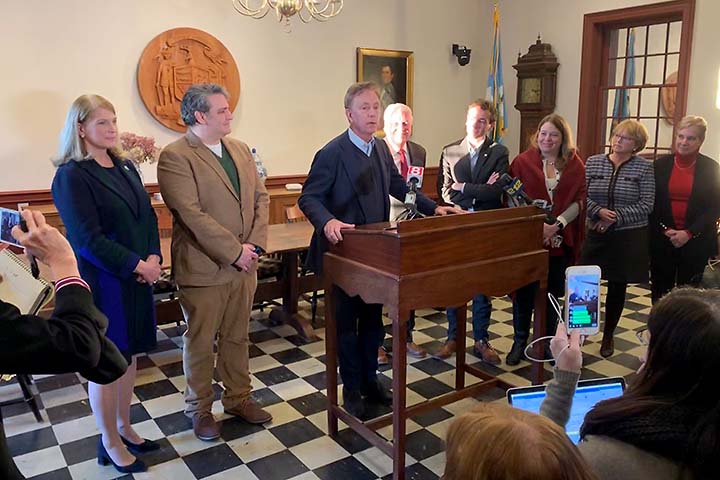Lamont: No Mandated Regionalization, “Nothing Has to Change”

February 26, 2019 — Governor Ned Lamont assured leaders of several Fairfield County towns today at Town Hall that his education bill does not mandate regionalization of schools or require shared services among districts.
The governor’s bill, SB-874, was presented shortly after his budget address to the legislature last week. It was introduced by Senator Martin Looney, whose earlier bill, SB-738, generated alarm in Weston and surrounding communities. It had proposed creating a State commission with the power to mandate school district consolidation in towns with a population below 40,000.
The governor wants a commission too, but one to first study potential cost savings, then make recommendations for achieving efficiencies, and then to offer incentives to districts that choose to implement them.
"It's Your Schools"
“My bill very clearly says ‘this is your school system,’” said the governor. “There are things I’d like to do that give incentives to share services and hold down costs, but there’s no obligation to do so. At the end of the day, it’s your schools.”
SB-738 has not been officially withdrawn, but we believe the governor’s proposal effectively sets it aside.
A related measure offered by Senator Bob Duff of Norwalk, SB-457, called for requiring districts with fewer than 2,000 students to merge with others. It would not have applied to Weston, where schools educate some 2,400 students. We believe it, too, will be superseded by the governor’s proposal, which is co-sponsored by Senator Duff.
"I’m not asking anyone to give up local control"
In a press conference following his several-hour meeting with local leaders, Governor Lamont said “My plan uses carrots, not sticks. I’m not asking anyone to give up local control over schools. I know how important local control of schools is.”
The governor said “here in Weston they’ve got a great school system. They love their school system the way it is. They don’t get that much money from the State. So be it. The same goes for Wilton and other towns represented here. Nothing has to change.”
The meeting was attended by representatives from Weston, Westport, Easton, Wilton, Redding, Monroe, Darien, Fairfield, and Trumbull.
Mr. Lamont said “I do believe, strongly, that for a lot of towns with diminishing school populations, it’s getting more and more expensive, with lots of superintendents and lots of principals. I’d like to give them incentives through the bonding process to see if they can combine some services and have a more efficient system. That way the money goes to the classroom, where it should go.”
The governor said Connecticut is “one of the only states that spends more money outside the classroom than in the classroom, and it’s costing us a fortune. We have 169 towns and over 200 school districts, and we’re in a world of hurt. I’ve got to come up with some real solutions.”
The governor’s plan gives bonus points for construction grants to towns where identified opportunities to share services are implemented. The formula itself is based on financial need. Our synopsis of Governor Lamont's bill can be found here.
Pension Fund Contributions by Towns
We asked Governor Lamont about his proposal to make towns pay part of teacher pension fund contributions. In Weston’s case, as the plan is phased in, it would eventually add close to $1 million to town expenses.
We asked if there have been discussions about possibly reducing the percentages of town contributions. “We just discussed it in some detail,” said the governor. His plan, he said "is very different than proposals in the past. The State didn’t do its share in funding the teachers pension fund over the last 50 years. So now I’ve got to figure out how to make it work so teachers in the future know our word is our bond.”
The governor said he heard from the local leaders “loud and clear. They want to know if we can at least smooth it out a little bit so they can plan for it. And I said, yeah, I’ll take a look at that, but I still have to come up with a budget that’s in balance. So, the homework is back on my plate.”
"A Constructive Conversation"
Several of the bi-partisan group of municipal leaders spoke highly of the meeting, including First Selectman Chris Spaulding.
“I’m thrilled the governor was incredibly open. He wants to understand ideas and listen to us. I also want to commend him for looking at the state’s big picture problems. At least we’re starting to tackle them now. The key will be communication between the governor, municipal leaders, and citizens.”
Wilton First Selectman Lynne Vanderslice said it was "a very good dialogue," and liked how the governor responded to several issues she had raised in an op-ed earlier in the day.
Mr. Lamont returned the compliment. “I learned a lot. I’m so happy. I went up to the legislature and said this is the first draft of a difficult budget and anybody who has a better idea, please come see me. I’m still waiting for that. Today we had a very constructive conversation.”
